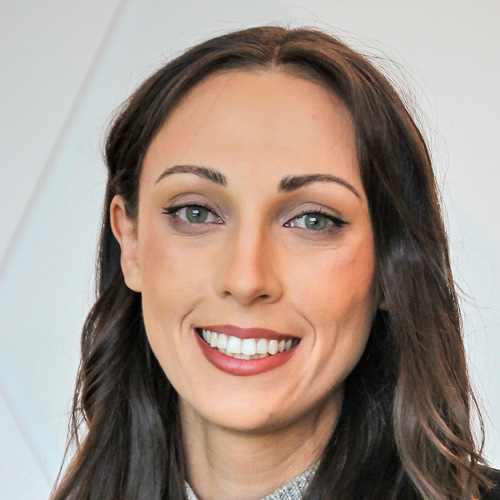
Rachael Zemek
Honorary Research Associate
BSc (Hons), PhD
rachael.zemek@thekids.org.au
https://www.linkedin.com/in/rachaelzemek/In late 2023, Rachael was awarded a Fred Hutchinson IIRC Fellowship – a prestigious appointment aimed to support immunotherapy research and she has since relocated to the Fred Hutch Cancer Centre based in Seattle. She is a Postdoctoral Research Fellow in the Newell Lab to identify the time-dependent events that activate tumor-specific T cell responses after surgical removal of solid tumors and after checkpoint-blockade immunotherapy.
Rachael aims to inform the optimal timing when scheduling these therapies in relation to each other, for improved immunotherapy responses. At The Kids, Rachael’s work in immunotherapy treatments for sarcoma has made breakthrough discoveries to advance our understanding about why some cancers do not respond well to immunotherapy and has identified effective new drug combinations to improve responsiveness to immunotherapy. Her skillset spans both the lab and computational analyses, allowing her to combine immunology, cancer biology, computational biology and drug discovery.
Rachael is a successful NHMRC Emerging Leader (Lvl 1) Investigator Grant recipient and is currently an Honorary Research Associate at The Kids Research Institute Australia and collaborates closely with the team to continue the research program, produce manuscripts, and supervise students.
Find Dr Zemek on ORCID.
Published research
Local therapy with combination TLR agonists stimulates systemic anti-tumor immunity and sensitizes tumors to immune checkpoint blockade
Exploiting temporal aspects of cancer immunotherapy
Many mechanisms underlying an effective immunotherapy-induced antitumour response are transient and critically time dependent. This is equally true for several immunological events in the tumour microenvironment induced by other cancer treatments. Immune checkpoint therapy (ICT) has proven to be very effective in the treatment of some cancers, but unfortunately, with many cancer types, most patients do not experience a benefit.
Time-course RNAseq data of murine AB1 mesothelioma and Renca renal cancer following immune checkpoint therapy
Time-critical transcriptional events in the immune microenvironment are important for response to immune checkpoint blockade (ICB), yet these events are difficult to characterise and remain incompletely understood. Here, we present whole tumor RNA sequencing data in the context of treatment with ICB in murine models of AB1 mesothelioma and Renca renal cell cancer.
Immune checkpoint therapy responders display early clonal expansion of tumor infiltrating lymphocytes
Immune checkpoint therapy (ICT) causes durable tumour responses in a subgroup of patients, but it is not well known how T cell receptor beta (TCRβ) repertoire dynamics contribute to the therapeutic response.
Protocol for delivery of intraoperative immunotherapy to mice by surgical debulking of subcutaneous tumors
Pre-clinical studies developing novel therapies to prevent cancer recurrence require appropriate surgical models. Here, we present a protocol for surgical debulking of subcutaneous tumors in mice, which allows for intraoperative application of immunotherapy-loaded biomaterials.
Celebrating 100 years of Immunology & Cell Biology – a special focus on the field of tumor immunology in Australia
In this Commentary article, as part of the 100-year celebrations of the journal, we reflect on the contribution of articles published in ICB in the field of tumor immunology. A highlight is a series of interviews conducted with three Australian-based ICB authors who have contributed key papers over the years: Rajiv Khanna, Delia Nelson and Ian Frazer.
A surgically optimized intraoperative poly(I:C)-releasing hydrogel prevents cancer recurrence
Recurrences frequently occur following surgical removal of primary tumors. In many cancers, adjuvant therapies have limited efficacy. Surgery provides access to the tumor microenvironment, creating an opportunity for local therapy, in particular immunotherapy, which can induce local and systemic anti-cancer effects.
Geldanamycin treatment does not result in anti-cancer activity in a preclinical model of orthotopic mesothelioma
Mesothelioma is characterised by its aggressive invasive behaviour, affecting the surrounding tissues of the pleura or peritoneum. We compared an invasive pleural model with a non-invasive subcutaneous model of mesothelioma and performed transcriptomic analyses on the tumour samples.
Education and Qualifications
- 2010-2012 - Bachelor of Science in Biological Science and Biomedical Science – Murdoch University
- 2013 - Honours in Molecular Biology – Murdoch University
- 2015-2019 – Doctor of Philosophy – University of Western Australia
Awards/Honours
- 2020 - Early Career Cancer Researcher of the Year, Cancer Council WA
- 2022 - Finalist; Early Career Scientist of the Year, Premier’s Science Awards
- 2023 - Illuminate Pitchfest - People’s Choice, Best investor pitch, The Kids Research Institute Australia
- 2023 - Friends of the Institute Travel Award, The Kids Research Institute Australia
- 2022 - WA Dept of Health Award of Excellence, Best presentation, Australian Society for Medical Research
- 2020 - Investigator Award, Best presentation, Australian and New Zealand Society for Immunology
- 2020 - GRS Publication Award, Best publication, University of Western Australia
- 2019 - Raine Research Prize, Best publication by an ECR, Raine Research Foundation
- 2019 - Manuscript Prize, Best publication, Combined Biological Sciences Meeting
- 2020 - Dean’s Honourable Mention for PhD Thesis (top 5%), University of Western Australia
- 2018 - Geoffrey Kennedy Convocation Postgraduate Award, University of Western Australia
- 2018 - Travel Award, Willoughby Foundation
- 2018 - International Travel Award, Norway University of Science and Technology
- 2018 - Young Investigator Award, International Mesothelioma Interest Group
- 2016 - Travel Award, Australian and New Zealand Society for Immunology
- 2015 - Runner up, 3 Minute Thesis Competition, University of Western Australia
- 2015 - People’s Choice, 3 Minute Thesis Competition, University of Western Australia
Active Collaborations
- Member – Cancer Research Trust Single Cell Cancer Consortium
- WA state councillor – Australian and New Zealand Society for Immunology
- Dr Melvin Chin (Clinician, Sir Charles Gairdner Hospital)
- Dr Elena Denisenko (Harry Perkins Institute)
- Dr Anthony Buzzai (Otto-von-Guericke-Universität Magdeburg, Germany)
